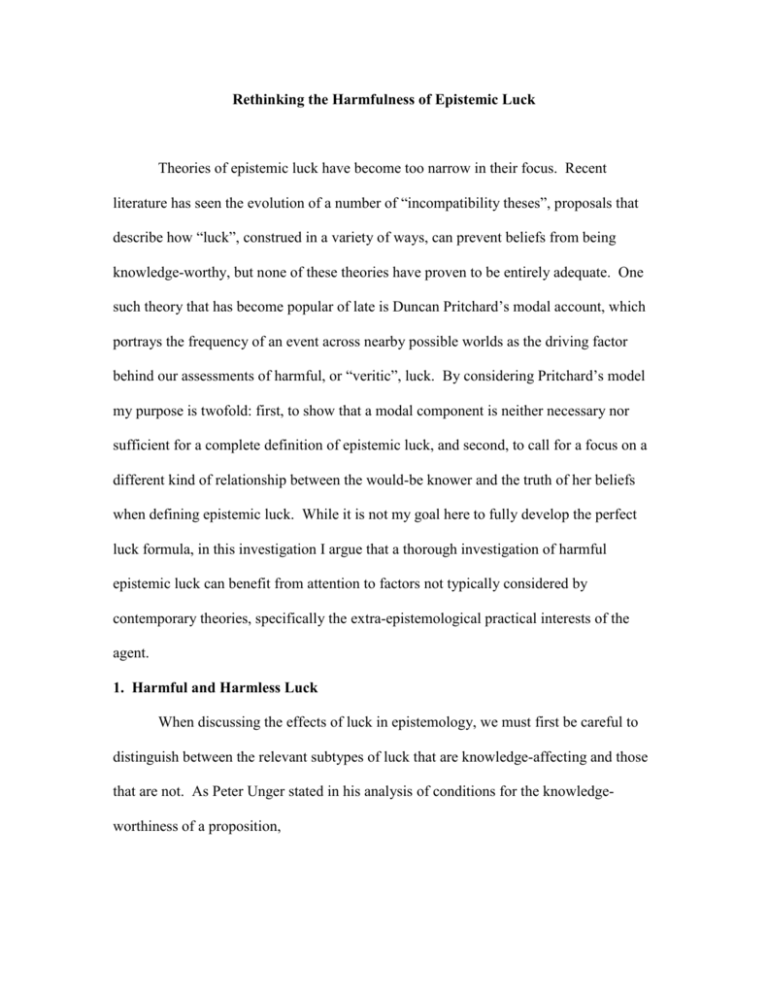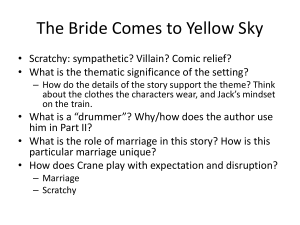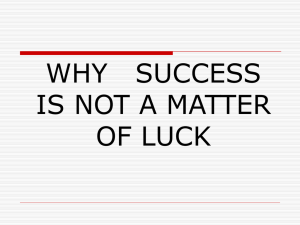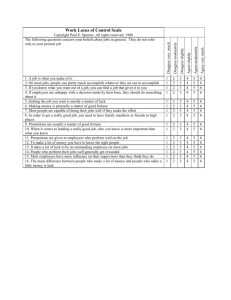Rejecting the Incompatibility Thesis: How Bad Beliefs Can Lead
advertisement

Rethinking the Harmfulness of Epistemic Luck Theories of epistemic luck have become too narrow in their focus. Recent literature has seen the evolution of a number of “incompatibility theses”, proposals that describe how “luck”, construed in a variety of ways, can prevent beliefs from being knowledge-worthy, but none of these theories have proven to be entirely adequate. One such theory that has become popular of late is Duncan Pritchard’s modal account, which portrays the frequency of an event across nearby possible worlds as the driving factor behind our assessments of harmful, or “veritic”, luck. By considering Pritchard’s model my purpose is twofold: first, to show that a modal component is neither necessary nor sufficient for a complete definition of epistemic luck, and second, to call for a focus on a different kind of relationship between the would-be knower and the truth of her beliefs when defining epistemic luck. While it is not my goal here to fully develop the perfect luck formula, in this investigation I argue that a thorough investigation of harmful epistemic luck can benefit from attention to factors not typically considered by contemporary theories, specifically the extra-epistemological practical interests of the agent. 1. Harmful and Harmless Luck When discussing the effects of luck in epistemology, we must first be careful to distinguish between the relevant subtypes of luck that are knowledge-affecting and those that are not. As Peter Unger stated in his analysis of conditions for the knowledgeworthiness of a proposition, 1 [A] complete absence of the accidental is claimed, not regarding the occurrence or existence of the fact known nor regarding the existence or abilities of the man [sic] who knows, but only as regards a certain relation concerning the man and the fact” (Unger, emphasis added). Thus, the “accident”, or luck that is important in epistemic evaluations is that which is involved with an agent’s connection to the truth of a proposition, not the existence of the agent or the proposition itself. Duncan Pritchard has since expanded upon Unger’s analysis and has distinguished three separate sub-types of what he calls “benign varieties of luck.” First, content epistemic luck, where “[i]t is lucky that the proposition is true” (Pritchard, 134); second, “capacity epistemic luck”, where “[i]t is lucky that the agent is capable of knowledge” (Pritchard, 134); and finally, “evidential epistemic luck”, where “[i]t is lucky that the agent acquires the evidence that she has in favour of her belief” (Pritchard, 136). These categories can be summarized with a term that John Greco borrows from literature in moral theory: “situational luck,” where luck is present, but it is not significant in our further evaluations, be they moral or epistemic (Greco, 20). In all of these cases, then, something is lucky, but it is not the kind of luck that prevents us from knowing. More difficult is the project of defining what constitutes the class of harmful epistemic luck. Sherrilyn Roush states the broad conditions as follows: [T]he problem is that the link between a subject’s belief and the truth of that belief is accidental, a matter of mere luck. To take [Gettier examples] seriously is to presume that there should not be too much luck in the relationship between the fact that a belief is held and the fact that the belief is true (Roush, 40). 2 Pritchard expresses this idea concisely with his simple statement that malignant or “veritic” luck is involved in cases where “[i]t is a matter of luck that the agent’s belief is true” (Pritchard, 146). The task, then, is to decode this seemingly innocuous statement into a widely applicable luck formula; indeed, there have been numerous proposals as to what constitutes harmful epistemic luck and potential ways of construing knowledge as to circumvent these effects, too numerous to list in any specific detail here1. While each one of these theories deserves attention, my focus in this investigation will be on Pritchard’s. 2. The Modal Conception Pritchard has recently proposed a safety condition as the driving factor behind luck assessments, which he expresses in modal language: [T]he agent’s belief is true in the actual world, but in a wide class of nearby possible worlds in which the relevant initial conditions are the same as in the actual world – and this will mean, in the basic case, that the agent at the very least forms the same belief in the same way as in the actual world…- the belief is false.2,3 (146) A modally driven conception of luck simpliciter does not adequately distinguish between harmless and harmful varieties, as some of the aforementioned examples of situational luck may nevertheless be modally uncommon: many cases of capacity epistemic luck, for example, involve beliefs that are true in only a minority of possible worlds, for the simple See, for example, Roush’s development of a Nozickean “truth-tracking” account (Roush 2005), John Greco’s account of knowledge as credit-worthy true belief (Greco 2004), Ernest Sosa’s appeal to epistemic virtues (Sosa, 1988), amongst others. 2 “Wide class” proves to be somewhat tricky. Pritchard eventually concludes that as long as there is not a distinct set of nearby possible worlds that contradict the proposition in question, then that proposition is true in a sufficient proportion of possible worlds. 3 There has also been worry expressed about the exact nature of “modality” that Pritchard is using. This is not a concern I will address here. 1 3 fact that one exists at all, and thus is able to hold these beliefs, in only a minority of worlds. What is needed to account for the harmful aspect of luck is the extra stipulation expressed by Roush and Unger, that something about the connection between the agent and the truth of the proposition needs to be lucky in order for there to be epistemic significance. Pritchard addresses this need with the inclusion of his “relevant initial conditions” clause, where “the nearby possible worlds that are at issue are specifically those worlds where at the very least the agent forms her belief in the same way as she does in the actual world” (Pritchard, 152). The modal characteristic of luck stems from Pritchard’s adherence to a safety condition on knowledge, which he states (after several formulations) as follows: “For all agents, , if an agent knows a contingent proposition , then, in nearly all (if not all) nearby possible worlds in which she forms her belief about in the same way as she forms her belief in the actual world, that agent only believes that when is true” (Pritchard, 163). Under Pritchard’s conception, then, an agent who holds a true belief concerning a proposition , but does not meet the safety condition, is therefore lucky that her belief is true, and as a result does not possess knowledge of . Pritchard’s conception is popular because of its simplicity and ability to give intuitive results in a number of classic cases involving luck. Consider, for instance, the “barn façade” scenario, where an agent drives past what look to be a number of regular barns, points to one and forms a belief that “there is a real barn.” As it so happens, our hapless agent has picked out the only real barn for miles around: all of the others are actually cleverly painted barn façades. The intuition in these cases is typically that the agent does not possess a knowledge-worthy belief about the existence of the barn he has indicated, and under Pritchard’s model we are treated to a readily available explanation: 4 in many nearby possible worlds the agent points at one of the many façades instead, and thus while his belief may be true in this world, it is false in the large majority of nearby possible worlds where the relevant initial conditions remain constant (in this case, such conditions may be that the agent drives to the same destination, that there are barn façades, that the agent is generally aware of what barns look like, etc.). More mundane examples of luck are also seemingly explained by Pritchard’s model: betting on the toss of a die, or guessing the number I am thinking of between one and ten, for example, are both kinds of cases that exhibit the modal rarity expressed by Pritchard’s account. While this account is prima facie attractive, it will be shown that a modal component is neither necessary nor sufficient for a complete luck formula, because counterfactual robustness (or lack thereof) can be established independently of the agent’s belief-forming process. This, I suggest, should lead us to thinking of epistemic luck in a fundamentally different way. 3. Lackey’s Criticism Pritchard’s conception has recently been challenged in a review by Jennifer Lackey. Lackey objects that there are cases in which a proposition may be true across many nearby possible worlds, but are nevertheless intuitively lucky; by showing this, she calls into question the necessity of Pritchard’s criteria. More damaging still, she does not merely present a single counterexample, but instead provides a formula for generating counterfactually common but intuitively lucky cases: All one has to do is first choose a paradigmatic instance of luck, such as winning Jeopardy through a pure lucky guess, emerging unharmed through no special assistance from what would otherwise be a fatal accident, saving a drowning 5 kitten by stumbling into a river, etc.; secondly, construct a case involving such an event in which both its central aspects are counterfactually robust, though there is no deliberate or otherwise relevant connection between them; thirdly, if there are any residual doubts that the event fails [Pritchard’s modal infrequency criterion], add further features to guarantee counterfactual robustness across nearby possible worlds. Voilà: one has a counter-example to [Pritchard’s modal account of luck]. (286) An example will make the criticism more overt. Applying Lackey’s procedure to a standard Gettier case produces the following: The Job Interview: Jones has an interview for a job at the local Ford plant. She is very nervous and is trying to think of topics for casual conversation with her interviewer while she waits to be called into the president’s office. Without thinking too much about it, she asks a secretary what kind of car the president drives. Somewhat confused, he answers: a Ford. On the basis of this information, Jones forms a belief that someone in the office drives a Ford. It is, however, the well-kept secret of the president of Ford that he drives a Chevy4. Thus, Jones’ belief is true (since almost every other employee drives a Ford)5 but not knowledge-worthy. In this situation, Jones’ belief that someone in her office drives a Ford is true in the actual world, as well as in all nearby possible worlds where the relevant initial conditions of her belief-forming process remain the same, yet we would still intuitively consider it a matter 4 It might not have to be a well-kept secret. It might be well known that the president drives a Chevy, but the secretary is simply unaware of the fact, and takes a reasonable guess. 5 We can make the fact that someone in the Ford office drives a Ford more counterfactually robust, if the conditions as they are set out now are found inadequate: say, that it is a company-wide policy that all employees must drive a Ford (this would be an implementation of the third step in Lackey’s fomula). 6 of luck that her belief that “someone in the office drives a Ford” is true. The “paradigmatic” instance of luck in this case is of the familiar Gettier variety, where an agent reaches a conclusion that just so happens to be true on the basis of a faulty inference. Following Lackey’s formula, however, we can construe the example such that due to Jones’ particular situation, the conclusion she reaches will be true in all nearby possible worlds; furthermore, this counterfactual robustness is independent of her beliefforming process. Lackey’s project, then, shows that counterfactual robustness is too easily rigged for a modal conception to be the right one to guide our intuitions: any example, it seems, can be made to have any combination of modal rarity and intuitive luckiness we like. Although this class of examples gives us good reason to seek a more adequate definition of luck elsewhere, to dismiss the promise of modality entirely it will also be required to show that a modal component is not sufficient is determining luck, in addition to not being necessary. It is to this task that I turn now. 4. The Identical Twins The job of establishing the non-sufficiency of modality requires a more thorough examination of the nature of luck itself. Unger’s examples of epistemically harmless luck show that the luck involved in the occurrence of an event is not of the sort that is salient in epistemic evaluations. The same goes for capacity epistemic luck, where the luck involved in the existence of the agent or her abilities is not epistemically significant, and in evidential epistemic luck, where the luck involved in the possession of evidence in support of a true belief does not, by itself, make that belief knowledge-unworthy. These aspects of the belief-forming process are lucky, but do not affect the knowledge worthiness of the beliefs being formed. There are, however, lucky aspects of belief 7 forming processes that are epistemically significant. For instance, in the aforementioned modified Gettier case, the luck of Jones’ belief affects the knowledge-worthiness of the conclusion she reaches on the basis of that belief. This can be expressed as: Luck transfers through inference: If a belief is veritically lucky, then any (immediate) conclusions reached using that belief as a premise is also veritically lucky6. This lemma is a logical consequence of a modal interpretation: if a belief is veritically lucky, then it is true in the actual world but not in a wide class of nearby possible worlds. Thus, any true conclusion inferred from that belief will again be true in the actual world, but will be false in a class of nearby worlds as wide as the class in which the premise is false, since the truth of the premise should be considered a relevant initial condition in the belief forming process. In addition to its ability to transfer, luck is intuitively able to come in degrees. Winning a lottery where, say, 1,000 tickets were sold is luckier than if there had only been 10 such tickets. In a similar vein, it also stands to reason that if the occurrence of one event (or the holding of a belief that is lucky to be true) is lucky, then the occurrence of two in conjunction is even luckier. This can be expressed as: Luck accumulates across conjunctions: If an agent’s beliefs in two propositions a and b, represented by B(a) and B(b), are both veritically lucky, then a belief in their conjunction, B(a & b), is luckier than either B(a) or B(b). For instance, if I believe that the first toss of a fair coin will come down heads and the second tails, and I happen to be right both times, then my individual beliefs, B(first toss comes down heads) and B(second toss comes down tails) are both veritically lucky, and “Immediately” is added here as a caveat, as I think it possible that luck should play an increasingly minor role in subsequent inferences, although I do not go into that possibility here. 6 8 my belief in their conjunction, B(first toss comes down heads and second toss comes down tails) is veritically lucky as well, and luckier than either of the conjuncts. Looking at the situation modally, the class of possible worlds where my belief is false becomes wider as additional coin-tossing propositions are conjoined. This feels intuitively plausible: I would be luckier still to have a true belief about the result of three coin tosses, even luckier for four, etc., and this is expressed by an increasing modal rarity of the truth of this series of conjoined propositions. From a modal standpoint, the conjunction of two propositions is true in as many or fewer worlds as the more modally infrequent of the two propositions that comprise the conjunction, so if one or both of the propositions are modally infrequent enough to be lucky, the conjunction of those propositions will also be lucky7. For example, in the coin-tossing case, after the first toss of a coin, given all nearby possible worlds the scope of those where my belief is true is small enough such that my belief should be considered lucky. By conjoining belief in another proposition to the first, those possible worlds in which the second proposition is true as well is necessarily a subset of the first. Thus, according to a modal model, if each believe in a conjunction of two or more beliefs is lucky, belief in the conjunction will be lucky, as well. While all of this seems prima facie reasonable, even intuitive, there are cases where following these modal rules give unintuitive results. Consider, for instance: The Identical Twins: Eugene has invited a set of identical twins to his party, Judy and Trudy. The night of the party there are many people around, and Eugene is asked whether Judy and Trudy decided to show up. He looks to his left, and in 7 This is a natural consequence of the statistical necessity that the probability of two events occurring is less than or equal to the probability that the less likely event will occur. 9 one room sees Judy, who he mistakes as Trudy. He looks to his right, and in another room sees Trudy, who he mistakes as Judy. Eugene forms the belief and tells his friend: both Judy and Trudy are at the party, and his belief is true. In this case the agent, Eugene, initially forms two beliefs: one, that Judy is at the party, and another, that Trudy is at the party. Each belief individually is veritically lucky: his belief that Judy is at the party is based on his actually seeing Trudy, but since Judy is at the party (just out of sight at the time of the belief formation) his belief is true. The same reasoning applies to his belief about the presence of Trudy. Neither of Eugene’s beliefs about the whereabouts of Judy or Trudy individually are safe, and neither should count as knowledge, but it nevertheless seems that his belief that the both of them are at the party is knowledge-worthy in addition to being true. The above lemmas, however, dictate that the belief in the conjunction of vertically lucky propositions should be veritically lucky itself. Consider the first, that luck transfers across inference. In this case, Eugene infers from not one, but two veritically lucky premises to a true conclusion, and thus the lemma would dictate that his conclusion should be veritically lucky as well. In addition, since he has formed a belief in two veritically lucky beliefs, the conjunction should be veritically lucky as well. Here then is a case where it appears that an agent is sufficiently responsible for the truth of a knowledge-worthy proposition he believes in the actual world but not in a wide class of nearby possible worlds. If this is the case, then it shows that a modal conception is not sufficient in defining epistemic luck. In addition to the previous class of examples put forth by Lackey that purport to show that a modal condition is also not necessary, this should lead us to rethinking the nature of epistemic luck. 10 5. Luck and Practical Interests So far, the project has been entirely destructive, and while I will not attempt to give a complete definition of epistemic luck, there are unattended areas in epistemology that I think, given sufficient attention, could help us reach a more complete definition of luck. To begin, consider the following from Michael Williams’ chapter about skepticism in the Blackwell Guide to Epistemology: Knowledge and justification always involve…an element of epistemic luck. A belief whose truth is wholly accidental cannot count as knowledge. But…getting things right is never wholly nonaccidental either (59)8. Williams paints quite a different picture of luck than Pritchard, Williams’ being one where knowledge is not incompatible simpliciter with epistemic luck, only a certain amount of it. Williams’ argument is couched within a discussion of the problems posed by skepticism: his claim amounts to the realization that since skeptical possibilities are always, in some ways, at least potentially present in epistemic evaluations, we can never be fully responsible for the truth of our beliefs. A central project in studies of skepticism is then to identify which of those possibilities are either relevant or salient in given epistemic evaluations, but Williams’ point is that when we disregard possibilities that we cannot defeat but only ignore, we are, in a certain sense, lucky if our belief turns out to be true. That we should only consider salient defeaters in our knowledge attributions saves the would-be knower from the skeptic, but does not guarantee immunity from luck. Despite his apparent opposition to Williams’ position, a gradient of luck can be found in Pritchard’s criteria, as well. That modal infrequency is the driving factor behind 8 The ellipsis refers to contextualism, but is removed because the problem is equally applicable to invariantists. 11 determining whether something is lucky implies that those events that are more modally infrequent should be “luckier” than those that are more common. The question that Williams poses and that Pritchard avoids is not then how luck is epistemically harmful, but how much is. Furthermore, the two fundamentally disagree on the question of when veritic luck is harmful: for Pritchard, always, for Williams, only sometimes. If we are sympathetic to the latter, then looking for a definitive answer to the question of how lucky a belief needs to be in order to be harmful in modal terms seems to be an act of futility, especially if we are able to rig counterfactual robustness in the style of Lackey’s examples. In Williams’ terms the important question concerns how many possibilities need to be eliminated before the luck becomes benign, but the answer is unclear. While I will not attempt to answer Williams’ question definitively, I believe that looking at work done in interest-relative, or stakes theory epistemology can help shed light on the problem. Consider the following example, now ubiquitous in interest-relative theories, expressed in the form presented here by Jennifer Nagel9: It’s late on Friday afternoon, and raining hard. Lo and her next-door neighbor Hi are thinking about going out to the bank, but wondering whether the trip could be postponed until tomorrow. Both of them can remember a recent Saturday visit to the bank, but neither of them has any further information relevant to the question of whether the bank will be open tomorrow. Nothing much is at stake for Lo—her banking errand could be done any time in the next week—but for Hi the question has burning practical importance. Hi knows he must deposit his paycheck before 9 The example was originally put forth in defense of contextualism (although not by Nagel), but has since been appropriated by interest-relative invariantists, such as Jason Stanley. 12 Monday, or he will default on his mortgage and lose his home. Does Lo know that the bank is open tomorrow? Does Hi? (1) The intention behind this example is to bring out the intuition that we are wont to ascribe knowledge to Lo more readily than to Hi. Since the two have the same evidence and reason in the same way, however, the intended conclusion is that extra-epistemological factors, namely the agent-relative stakes of the situation, are factors that need to be taken seriously in epistemic evaluation. If we are to talk in terms of salient possibilities, then interest-based factors help determine the set of potential defeaters that need to be eliminated for the belief to be considered knowledge-worthy: in Hi’s case, the possibility that she and Lo are mistaken about remembering the bank being open several Saturdays ago becomes salient, whereas it does not for Lo. The connection between luck and practical interests becomes apparent if we look at luck in something akin to Williams’ terms: if defeaters acquire salience as the result of the stakes that hinge on the truth of the proposition, and if luck is conceived of as a proposition being true while salient defeaters go undefeated, then luck is at least indirectly influenced by practical interests. These kinds of extra-epistemological factors play no role in Pritchard’s conception: the modal frequency of a proposition has no specific connection with the amount of importance the agent attaches to its truth10. In other words, in the case of Hi and Lo above, the class of possible worlds where the bank is closed is the same for both agents, and both of their beliefs are equally safe (or unsafe). Because of the stakes involved, we will intuitively feel that certain factors are salient in 10 The closest Pritchard gets to the human component of luck is his second necessary condition on luck, that luck necessarily involves human affairs. This condition is peripheral, however, and is only meant to eliminate of the possibility of, say, the occurrence of natural physical events that no one experiences from being counted as lucky. 13 the case of Hi that are not present in the same proposition for Lo. If Lo acts on a belief that the bank is closed and is correct, then we will not necessarily think that he was lucky. In the case of Hi, however, if she acts on the basis of the same belief as Lo, and is correct, then we are, I think, much more inclined to say that Hi was lucky in having her belief being true. While practical interests are not on their own able to drive a plausible theory of epistemic luck, they nevertheless capture an intuitive dimension of luck that the modal theory does not, namely that we often consider an agent to be lucky if she comes upon the truth by acting in ways we would generally not consider to be prudent. A successful luck ontology, then, should be able to accommodate these factors. 6. Conclusion That Pritchard’s conception is neither necessary nor sufficient for a definition of luck indicates that safety expressed modally cannot be the whole story in epistemic luck. Lackey’s project shows not only that modality is not necessary, but also that counterfactual robustness is a factor too easily manipulated in order to be a solid basis for defining a luck ontology. The lesson to be learned from this, I suggest, is that if epistemic luck is defined in terms of how frequently an event might occur, it misses Roush’s important “link between a subject’s belief and the truth of that belief.” This link, I suggest, can be conceptually recaptured if we look to extra-epistemological factors, namely the agent’s practical concerns. While these factors are not definitive in themselves, at least taking them into account helps create an idea of luck that is more intuitive. 14 Works Cited Lackey, Jennifer. “Critical Study: Pritchard’s Epistemic Luck.” The Philosophical Quarterly 56(223): 284-289, 2006. Nagel, Jennifer. “Knowledge Ascriptions and the Psychological Consequences of Changing Stakes.” Australasian Journal of Philosophy 86(2008), forthcoming. Pritchard, Duncan. Epistemic Luck. Oxford: Clarendon Press, 2005. Roush, Sherrilyn. Tracking Truth. Oxford: Clarendon Press, 2005. Sosa, Ernest. “Beyond Skepticism, to the Best of our Knowledge.” Mind: 1988. Unger, Peter. “An Analysis of Factual Knowledge.” Journal of Philosophy 65: 157-170, 1959. Williams, Michael. “Skepticism” in Greco, John and Ernest Sosa, The Blackwell Guide to Epistemology. Malden, Massachusetts: Blackwell Publishers, 1999.






